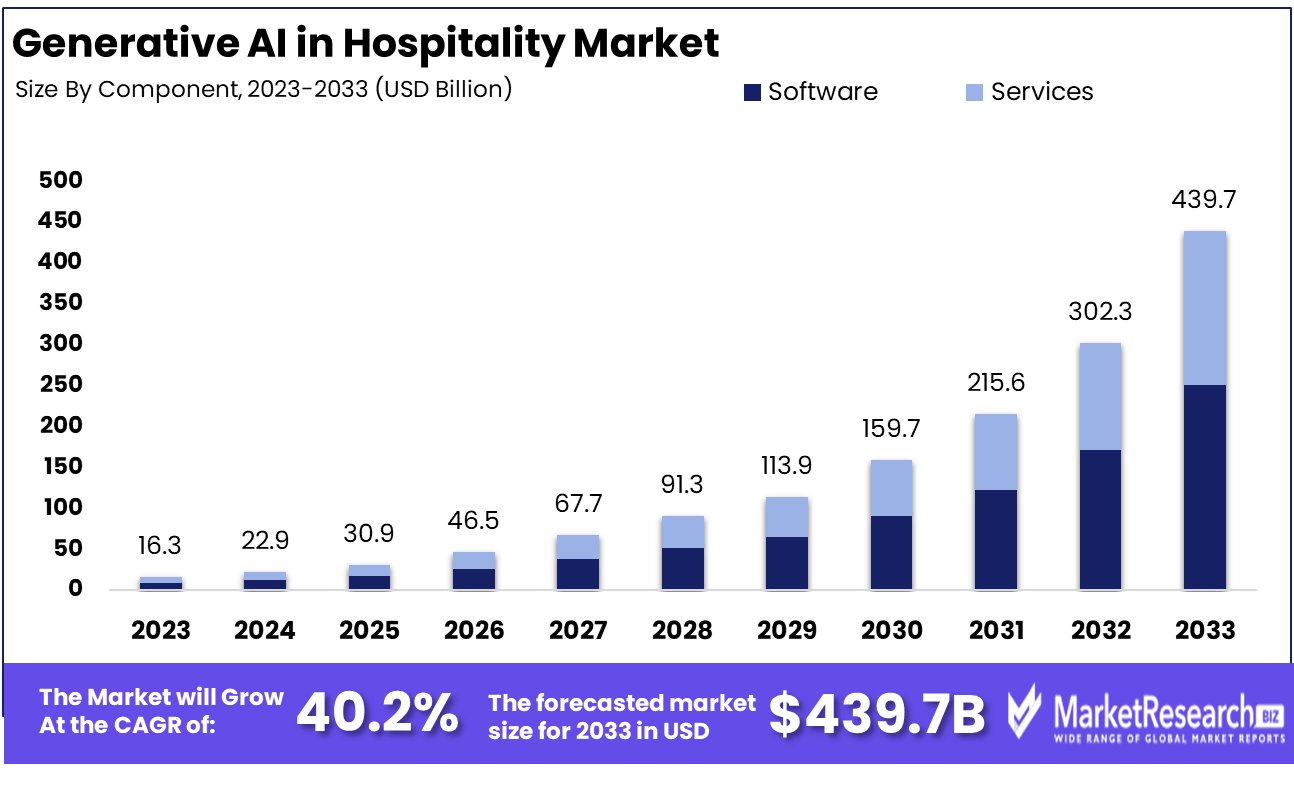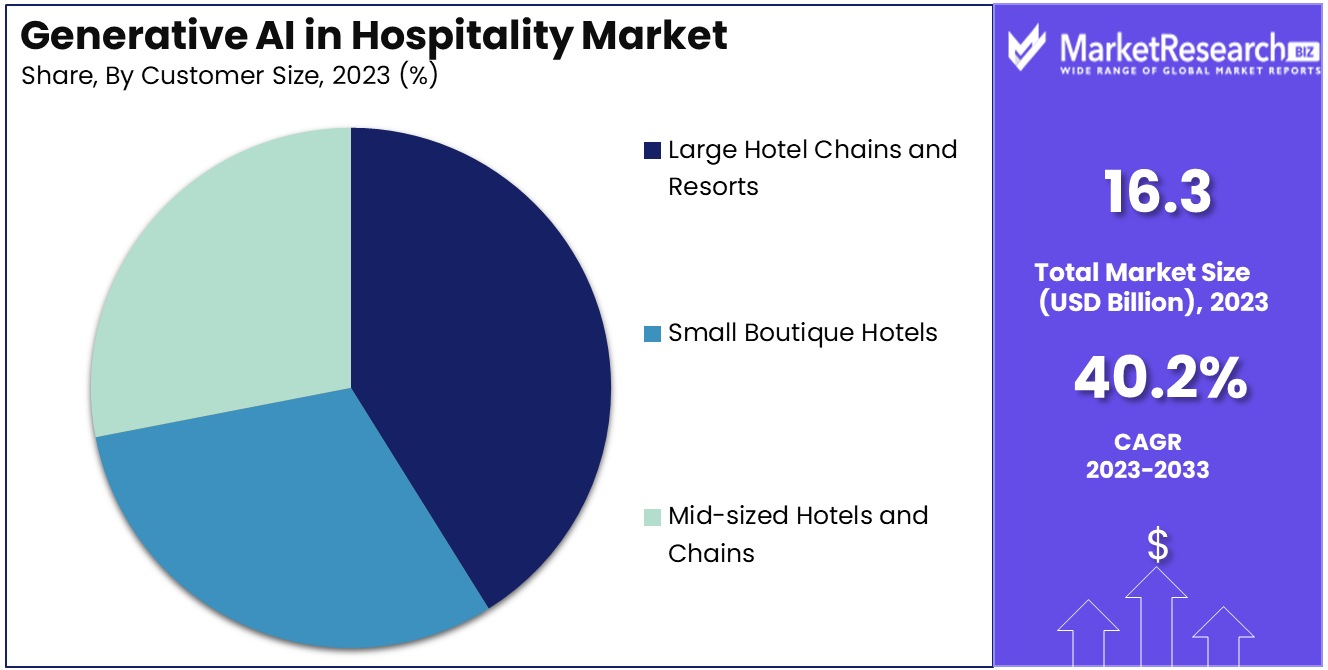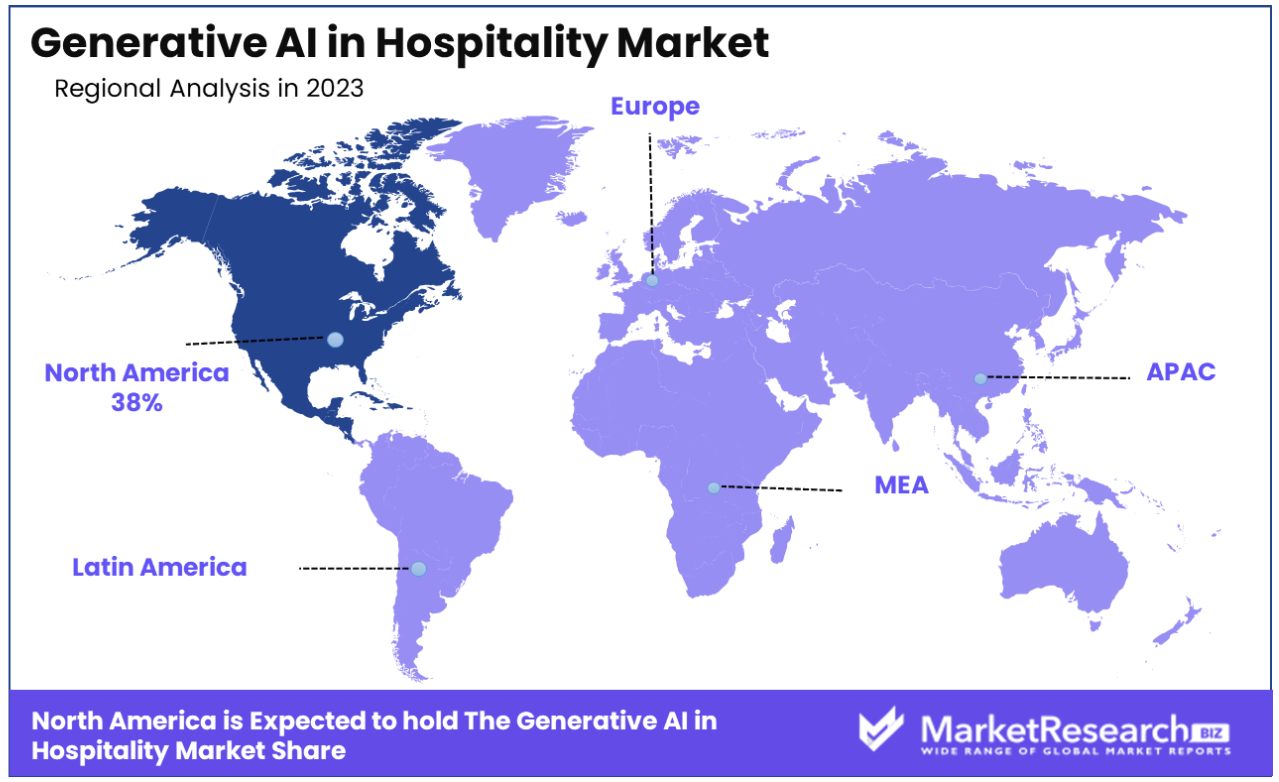
Generative AI in Hospitality Market By Component (Software, Services) By Application (Chatbots and Virtual Assistants, Personalized Recommendations, Demand Forecasting, Voice Assistants, Predictive Maintenance, Guest Experience Enhancement, Others) Customer Size (Large Hotel Chains and Resorts, Small Boutique Hotels, Mid-sized Hotels and Chains) By Region And Companies - Industry Segment Outlook, Market Assessment, Competition Scenario, Trends, And Forecast 2024-2033
-
43307
-
Jan 2022
-
172
-
-
This report was compiled by Correspondence Linkedin | Detailed Market research Methodology Our methodology involves a mix of primary research, including interviews with leading mental health experts, and secondary research from reputable medical journals and databases. View Detailed Methodology Page
-
Generative AI in Hospitality Market Size, Share, Trends Analysis
The Generative AI in Hospitality Market was valued at USD 16.3 Billion in 2023. It is expected to reach USD 439 Billion by 2033, with a CAGR of 40.2% during the forecast period from 2024 to 2033.

Generative AI in the hospitality market refers to the application of artificial intelligence technologies that autonomously produce content, such as text, images, or even music, to enhance various aspects of the hospitality industry. This technology utilizes algorithms trained on large datasets to create personalized experiences for guests, optimize operations, and streamline services. It can generate dynamic content for marketing, virtual concierge services, personalized recommendations, and even design solutions. By leveraging generative AI, hospitality businesses can improve customer satisfaction, increase efficiency, and stay competitive in a rapidly evolving industry landscape, where personalized and seamless experiences are paramount.
According to market analysts, the integration of generative artificial intelligence (AI) within the hospitality sector represents a significant opportunity for industry players to revolutionize guest experiences and operational efficiency. The emergence of generative AI technologies, leveraging advancements in deep learning and natural language processing, has provided hospitality businesses with powerful tools to enhance customer engagement, streamline operations, and drive competitive advantage.
One key aspect analysts emphasize is the potential for generative AI to personalize guest interactions at scale. By harnessing vast amounts of data, including guest preferences, historical behavior, and contextual information, hospitality providers can deploy AI-driven solutions to deliver tailored recommendations, bespoke marketing content, and intuitive virtual concierge services. This level of personalization not only enhances guest satisfaction but also fosters loyalty and repeat business.
Moreover, analysts highlight the role of generative AI in optimizing operational processes within the hospitality sector. From revenue management to resource allocation and service delivery, AI-powered systems can analyze data in real-time, identify patterns, and make proactive decisions to improve efficiency and reduce costs. For instance, AI-driven chatbots can handle routine guest inquiries, freeing up staff to focus on more complex tasks and enhancing overall productivity.
Furthermore, analysts underscore the potential of generative AI to drive innovation in product and service offerings. By leveraging AI-generated content for marketing campaigns, website design, and even room customization, hospitality businesses can differentiate themselves in a crowded market, attract new customers, and stay ahead of evolving consumer preferences.
Driving Factors
Personalization at Scale Drives Market Growth
The integration of Generative AI in hospitality ushers in an unprecedented era of personalization, enabling businesses to curate bespoke experiences at scale. This technological advancement empowers hotels and related entities to analyze vast datasets on consumer behavior and preferences, leading to the creation of highly customized recommendations and services. Such personalization fosters deeper guest loyalty and encourages repeat business, which is crucial in a sector where differentiation and customer satisfaction are paramount. The ripple effect of this tailored approach is profound, enhancing guest engagement and driving revenue growth. As businesses harness these insights to refine their offerings, the long-term outlook suggests a paradigm shift towards increasingly individualized guest experiences, setting a new benchmark for competitiveness in the hospitality industry.
Enhanced Guest Interactions Amplify Market Expansion
Generative AI is redefining the hospitality landscape through the enhancement of guest interactions. By deploying AI-driven chatbots and voice assistants, businesses are facilitating seamless, natural conversations with guests, covering a wide array of services from bookings to concierge assistance. This leap in communication efficiency not only elevates the guest experience but also optimizes operational workflows, allowing staff to concentrate on more complex, value-added tasks. The implementation of these technologies correlates with improved guest satisfaction scores, a key metric influencing loyalty and positive word-of-mouth. The synergetic effect of improved interactions and operational efficiencies underscores the potential for significant market expansion, with long-term implications including the standardization of AI-mediated communication as a core guest service.
Demand Forecasting Enhances Strategic Agility
Generative AI's capability to analyze and synthesize vast amounts of data for demand forecasting marks a transformative shift in the hospitality industry's approach to strategic planning. This predictive power enables businesses to anticipate fluctuations in guest demand with greater accuracy, facilitating more effective capacity planning and targeted promotional efforts. Such strategic agility not only optimizes revenue management but also aligns service offerings with market demand, ensuring higher guest satisfaction and occupancy rates. The integration of external factors into forecasting models further refines these predictions, enabling a proactive rather than reactive strategy. Over time, this data-driven approach is expected to cultivate a more resilient and adaptable industry, capable of navigating market volatilities with enhanced precision.
Automated Content Creation Streamlines Marketing Efforts
The adoption of Generative AI for automated content creation represents a significant efficiency gain for the hospitality industry. By automating the production of marketing materials, descriptions, and communication content, businesses can allocate human creativity toward strategy and innovation, rather than routine tasks. This shift not only reduces operational costs but also ensures a consistent brand voice across platforms. The scalability of content creation afforded by AI enables a more dynamic marketing approach, capable of adapting to changing guest preferences and market trends. As the sector continues to embrace digital engagement, the ability to rapidly produce high-quality, relevant content will become a critical factor in maintaining a competitive edge. The long-term trajectory points towards increasingly sophisticated AI applications in content strategy, further enhancing the industry's marketing
Restraining Factors
High Upfront Costs Limit Generative AI Adoption in Hospitality
The implementation of generative AI within the hospitality sector faces significant barriers due to the high initial investment required. This technology necessitates substantial financial resources for computing infrastructure, the development of data pipelines, and the training of models, making it prohibitive for smaller entities such as bed-and-breakfasts or independent hotels. The necessity for advanced technological frameworks and specialized expertise further exacerbates the challenge, leaving many businesses within the hospitality industry unable to leverage the potential benefits of generative AI, thus restraining market growth.
Data Privacy Concerns Constrain Generative AI Utilization in Hospitality
Data privacy emerges as a critical concern in the application of generative AI within the hospitality market. The industry handles sensitive guest information, from personal identifiers to preferences and behaviors. Utilizing AI to process and analyze this data introduces risks related to data governance and privacy. Guests may express apprehension towards their personal information being used for AI-driven analysis, fearing breaches of privacy. This concern is not unfounded, as instances of poor data management practices could lead to a loss of guest trust, discouraging them from patronizing businesses that employ such technologies, thus limiting the market's expansion.
Generative AI in Hospitality Market Segmentation Analysis
By Component Analysis
The software stands as the dominant segment within Generative AI in hospitality, accounting for 68% of the market. This dominance is underpinned by the foundational role software plays in enabling AI functionalities, from data processing algorithms to user interface designs that facilitate interactions between guests and AI systems. Software solutions offer scalable and flexible platforms for deploying AI applications, such as chatbots, virtual assistants, and personalized recommendation engines, which are integral to modernizing hospitality services. Services, while not the dominant segment, are critical for the implementation, maintenance, and optimization of AI software. This segment encompasses consulting, customization, and support services, ensuring that AI solutions are effectively integrated into the hospitality ecosystem and aligned with specific business objectives.
By Application Analysis
Within applications, Chatbots and Virtual Assistants emerge as the leading sub-segment, capturing 25% of the market. Their prominence is attributed to the immediate value they offer in enhancing guest service interactions, providing 24/7 assistance, and addressing common inquiries efficiently. This technology significantly improves operational efficiency and customer satisfaction by freeing up human staff to focus on more complex guest needs. Other applications like Personalized Recommendations, Demand Forecasting, Voice Assistants, Predictive Maintenance, and Guest Experience Enhancement play pivotal roles in leveraging data to tailor services to individual preferences, optimize resource allocation, and anticipate maintenance needs before they disrupt operations. Each application underscores a facet of Generative AI's potential to revolutionize hospitality by offering smarter, more intuitive, and personalized guest experiences.
Customer Size Analysis
Large Hotel Chains and Resorts are the primary adopters of Generative AI, representing 55% of the market. Their dominance is driven by the scale at which these entities operate, requiring sophisticated solutions to manage extensive guest interactions and operational complexities. Generative AI enables these large establishments to streamline operations, deliver personalized experiences at scale, and maintain competitive advantage. Conversely, Small Boutique Hotels and Mid-sized Hotels and Chains present significant growth opportunities. These segments can benefit from Generative AI to distinguish their offerings through enhanced personalization and operational efficiency. The adoption barriers for smaller entities often relate to investment and technical expertise, yet as Generative AI becomes more accessible and affordable, its penetration within these segments is expected to increase.

Generative AI in Hospitality Industry Segments
By Component:
- Software
- Services
By Application:
- Chatbots and Virtual Assistants
- Personalized Recommendations
- Demand Forecasting
- Voice Assistants
- Predictive Maintenance
- Guest Experience Enhancement
- Others
Customer Size:
- Large Hotel Chains and Resorts
- Small Boutique Hotels
- Mid-sized Hotels and Chains
Generative AI in Hospitality Market Growth Opportunities
Next-Gen Customer Support Revolutionizes Hospitality Experience
The hospitality industry stands on the brink of a transformation with the integration of generative AI in customer service. This technology enables the creation of chatbots capable of managing complex queries with a level of naturalness and understanding previously unattainable, addressing the longstanding issue of inadequate or slow human customer support. An AI concierge, for instance, could offer personalized activity recommendations based on guest preferences, elevating the customer experience while reducing the workload on staff. This advancement not only enhances guest satisfaction but also positions brands as forward-thinking leaders in customer service innovation.
Revenue Growth Enablement Through Generative AI in Hospitality
Generative AI presents a lucrative opportunity for the hospitality sector to unlock new revenue streams through the automation of ancillary offers, personalized upselling and cross-selling, and the application of smarter dynamic pricing strategies. This addresses the critical challenge of sub-optimal revenue generation by enabling tailored offerings that resonate with individual customer preferences and willingness to pay. For example, AI-powered systems can dynamically create personalized travel packages and special deals in real time, significantly improving conversion rates and customer loyalty. The adoption of such AI-driven approaches not only boosts revenue but also enhances operational efficiency, setting a new standard for strategic revenue management in hospitality.
Generative AI in Hospitality Market Regional Analysis
North America Dominates with 38% Market Share in the Generative AI in Hospitality Market
North America's commanding 38% stake in the Generative AI in the Hospitality market is largely fueled by the region's strong technological infrastructure and a high degree of innovation within the tech and hospitality sectors. The United States, in particular, is a hub for AI development, housing major tech companies that lead in AI research and application. This technological prowess, combined with a significant hospitality industry looking for competitive differentiation through personalized customer experiences and operational efficiency, drives the adoption of generative AI solutions.

The region benefits from a mature digital ecosystem, which facilitates the integration of AI technologies in hospitality services, from customer service chatbots to AI-driven personalization in booking platforms. Additionally, the high consumer demand for enhanced and personalized hospitality experiences encourages businesses to adopt generative AI. The presence of numerous startups and established companies focusing on AI solutions for the hospitality industry further stimulates innovation and market growth in this segment.
Europe: A Close Contender with Focus on Innovation and Regulation
Europe holds a significant position in the Generative AI in the Hospitality market, driven by its strong focus on innovation, particularly in countries like the UK, Germany, and France. The region's market share benefits from a well-established tourism industry, high digital adoption rates, and supportive government policies regarding AI and digital transformation. The European General Data Protection Regulation (GDPR) also ensures that AI applications respect privacy and data protection standards, which builds consumer trust in AI-driven services.
Asia Pacific: Rapid Growth through Digital Transformation and Emerging Markets
The Asia Pacific region is witnessing rapid growth in the Generative AI in the Hospitality market, spurred by digital transformation initiatives and the emergence of new economic powerhouses like China and India. The region's growth is characterized by a burgeoning middle class, increasing internet penetration, and a young, tech-savvy population eager to embrace new technologies. These factors, combined with the growing tourism and hospitality sectors in Southeast Asia, present vast opportunities for the application of generative AI in enhancing customer experiences and operational efficiency. However, the diversity in languages and cultural nuances poses unique challenges for AI applications, requiring localized and customized AI solutions.
Generative AI in the Hospitality Industry By Region
North America
- The US
- Canada
- Rest of North America
Europe
- Germany
- France
- The UK
- Spain
- Italy
- Russia
- Netherlands
- Rest of Europe
Asia-Pacific
- China
- Japan
- South Korea
- India
- New Zealand
- Singapore
- Thailand
- Vietnam
- Rest of Asia Pacific
Latin America
- Brazil
- Mexico
- Rest of Latin America
Middle East & Africa
- South Africa
- Saudi Arabia
- UAE
- Rest of the Middle East & Africa
Generative AI in Hospitality Market Competitive Analysis
The hospitality sector is undergoing a profound transformation, driven by the integration of generative AI technologies. Companies leading this change are leveraging AI to enhance customer experiences, streamline operations, and offer personalized services at scale.
IBM Watson empowers hospitality businesses with AI-driven insights to personalize guest experiences, optimize operations, and engage customers through intelligent virtual assistants.
Alibaba Cloud's AI solutions are utilized by hotels and travel companies to offer personalized travel recommendations, improve operational efficiency, and enhance the customer service experience with AI chatbots.
Amazon Web Services (AWS) provides a robust platform for hospitality companies to develop and deploy AI-driven applications, from personalized guest services to operational automation and predictive analytics.
Microsoft Azure offers AI services that enable the hospitality industry to create customized guest experiences, optimize inventory management, and automate routine inquiries through chatbots and virtual assistants.
Google Cloud's AI and machine learning capabilities help hospitality businesses analyze customer data for personalized marketing, optimize booking processes, and enhance guest services through voice and text-based interactions.
Intelity delivers a comprehensive guest engagement and staff management platform, utilizing AI to streamline operations, enhance guest services, and provide a seamless digital experience throughout the guest journey.
Volara provides voice-based AI solutions for the hospitality industry, enabling hotels to offer guests personalized services, information, and entertainment through voice commands.
Generative AI in Hospitality Industry Key Players
- IBM Watson
- Alibaba Cloud
- Amazon Web Services (AWS)
- Microsoft Azure
- Google Cloud
- Intelity
- Volara
- Hilton's Connie
- Satisfi Labs
- Other key players
Generative AI in the Hospitality Market Recent Development
- Jan 2024 Duve, a leader in personalized guest experience platforms and the winner of 2023 HotelTechReport’s “Best Guest Experience Platform”, today announced its acquisition of Easyway
- Sept 2023 Easyway, the first and leading generative AI technology provider for hospitality, announces today its completely automated guest communication platform.
Report Scope
Report Features Description Market Value (2023) USD 16.3 Billion Forecast Revenue (2033) USD 439.7 Billion CAGR (2024-2032) 40.2% Base Year for Estimation 2023 Historic Period 2016-2023 Forecast Period 2024-2033 Report Coverage Revenue Forecast, Market Dynamics, COVID-19 Impact, Competitive Landscape, Recent Developments Segments Covered By Type(Football, Baseball, Cricket, Basketball, Car Racing, Others), By Platform(Website, Mobile Application), By Demographics(Under 25 Years, Between 25 and 40 Years, Above 40 Years), By Application(Individual Competition, Team Competition) Regional Analysis North America - The US, Canada, Rest of North America, Europe - Germany, France, The UK, Spain, Italy, Russia, Netherlands, Rest of Europe, Asia-Pacific - China, Japan, South Korea, India, New Zealand, Singapore, Thailand, Vietnam, Rest of Asia Pacific, Latin America - Brazil, Mexico, Rest of Latin America, Middle East & Africa - South Africa, Saudi Arabia, UAE, Rest of Middle East & Africa Competitive Landscape Dream11, Fantasy Feud, MyFantasyLeague, Fox Sports Fantasy Football, StarsDraft, DraftKings, Bovada, Yahoo, CBS, NFL Fantasy, ESPN, Sportech, Fantrax, Digital Works.Pvt. Ltd., Sideline Software Inc., Blitz Studios Inc., I3 Interactive Inc., OFP Hosting Inc. Customization Scope Customization for segments, region/country-level will be provided. Moreover, additional customization can be done based on the requirements. Purchase Options We have three licenses to opt for Single User License, Multi-User License (Up to 5 Users), Corporate Use License (Unlimited User and Printable PDF) -
-
- IBM Watson
- Alibaba Cloud
- Amazon Web Services (AWS)
- Microsoft Azure
- Google Cloud
- Intelity
- Volara
- Hilton's Connie
- Satisfi Labs
- Other key players




